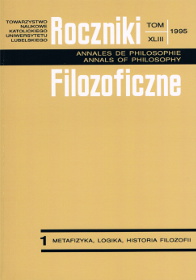The Transcendentals in the Historical Perspective (From Arché to Antitranscendentals)
Abstract
The main purpose of this paper is to show in outline the history of the transcendentals. Generally speaking we can pointed out two tendency of the interpretation of the transcendentals: first one is a positive interpretation according with that the transcendentals are closely connected with the elements or property of being, and the second one is a negative interpretation according with that we take away all properties of being. The XVII century we can point as a border of this interpretation.
In the scheme of the positive interpretation some philosophers identified the transcendental properties of being with the pre-elements (Eleats), the causes (Parmenides, Plato), the highest predicative words (Socrates, Plato), the passiones entis (Aristotle), the vehementia entis (Avicenna), the primae intentiones (St. Albert the Great), the modi essendi entis (St. Thomas Aquinas), the modus intrinsecus entis (Duns Scott), the conceptus formalis (Suarez), the veritates aeternae (Philip Canceler).
In the negative interpretation takes part the rejection of the essential property of being and some philosophers distinct the antitranscendentals as well. In this interpretation we can see the reduction of the transcendentals to the empty notion (Hobbes, Spinoza, Kant), replacement them by the physical property (Marxism), the identification them with the subjective property (Nietzsche), than some philosophers distinct the antitranscendentals like a nonentity, enmity, nonsense, etc. − as a property of being (Merleau Ponty, Sartre, Heidegger).
This historical perspective helps us to see the close connection between the philosophical cognition and the theory of transcednentals and between the theory of the transcendentals and the conception of being. Besides that the historical perspective gives us possibility to see the cognitional paradoxes and consequences that appears when the being has been deprived the essential properties or when this property have been separated from the being.
Copyright (c) 1995 Roczniki Filozoficzne

This work is licensed under a Creative Commons Attribution-NonCommercial-NoDerivatives 4.0 International License.





